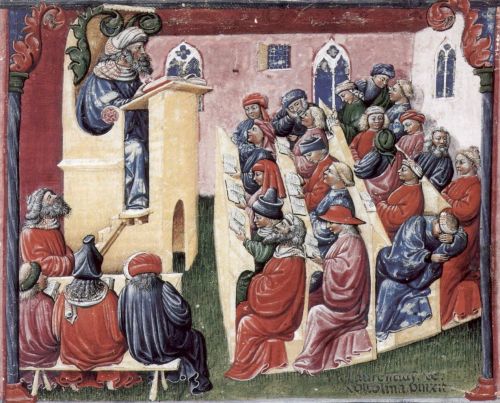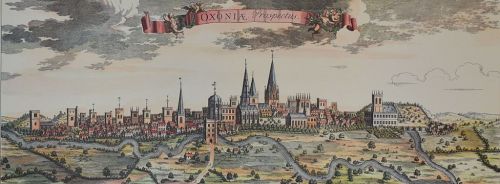Why February 10th is BRILLIANTBearing a GrudgeToday is Saint Scholastica’s Day. She was a
Why February 10th is BRILLIANTBearing a GrudgeToday is Saint Scholastica’s Day. She was a nun who was born in Umbria towards the end of the fifth century. But we don’t want to tell you about her today. Today we are writing about something truly awful that happened in the fourteenth century, in Oxford. Normally, we try to avoid mentioning events where people die, but this is so spectacularly dreadful that we can’t leave it alone. By the end of this post, almost a hundred people will be dead and you probably won’t be very happy with the outcome either. Today is the anniversary of the St Scholastica Day riot of 1355.Oxford is, as you probably know, a university town. It has been a centre of learning for around eight or nine hundred years. Relationships between the students and the general population have historically been somewhat strained. In 1209, either one or two students were hanged for the crime of murder; which the student responsible claimed was an accident. The ensuing bitterness surrounding the event led to all the students fleeing from the town. They did not return until 1214. Many of them went to Cambridge and that may have been when the university was founded there. When they returned, the Pope ordered that the town must pay a fine of fifty-two shillings a year to the university each year to provide a dinner for poor students as compensation. The students of Oxford must have all seemed, and mostly were, terribly rich in comparison to the townsfolk and this probably did not help everyone get along.On February 10th 1355, two students named Walter Spryngeheuse and Roger de Chesterfield were drinking in the Swindlestock Tavern in the centre of the town. They didn’t like the wine they had been sold. An argument broke out between the two students and the taverner, John Croidon, which ended with them throwing the wine in his face and hitting him over the head with the jug. Croidon called on friends and family and the disturbance grew. The town bailiffs asked the students to make amends, but they would not. The Mayor could do nothing himself because the students were members of the clergy and outside his jurisdiction. So he asked the Chancellor of the university to arrest them, but he refused. Instead, two hundred other students rallied around Spryngeheuse and Chesterfield and beat up the Mayor. The day ended with the students having the upper hand.The next day, the Mayor went to see the King, Edward III, who happened to be nearby at Woodstock. The King seems to have been no help at all. Meanwhile the Chancellor ordered his scholars to keep the peace. But, according to the town records, the students locked the gates of the town, set fire to stuff and robbed peoples’ houses, killing and wounding many. According to the university records, the students were out exercising in the fields when they were attacked by eighty townspeople with bows and arrows who had been hiding in a church. While this was happening the Mayor had managed to rally two thousand people from the surrounding countryside and they all arrived at the town and joined in the fray. The students fought, they said, until they ran out of weapons and then retreated to the university. Their assailants followed them and wrecked some of the scholars’ halls.The day after that was probably the worst day. The people of the town destroyed another fourteen of the students halls. Many were killed and some of the students were scalped and thrown into jail. Some monks tried to calm everyone down by carrying a communion wafer through the middle of the riot, but it didn’t really work. The townspeople just took it off them and threw it on the ground. By the time the riot had subsided, sixty-three scholars were dead and about thirty locals. We couldn’t find out how the rioting came to a halt, but we do know what happened subsequently. Many of the leading townsmen wound up in the Tower of London and the students, again, left the town. The King, who sat in judgement, found in favour of the students. When they returned to Oxford, they and their servants were granted immunity from prosecution for any felonies, robberies, arson or trespass that they had committed. Furthermore, they were afterwards allowed to regulate the drinks trade. Worst of all, on every subsequent February 10th, sixty-three leading members of the community, including the Mayor, were required to march through the town bareheaded, in an act of penance, to attend a church service at the university. They also each had to pay a a penny, a total fine of 5s 3d, to university funds. This penance continued for the next four hundred and seventy years. In 1825, the Mayor of Oxford refused to take part in the annual humiliation. All was not really forgiven until 1955, when the Mayor was granted an honorary degree and the Vice-Chancellor was made an Honorary Freeman of the city. It only took six hundred years, but we think things might be mostly okay now. -- source link
Tumblr Blog : whytodayisbrilliant.tumblr.com
#february 10th#whytodayisbrilliant#oxford university#grudge

